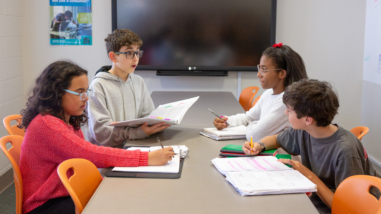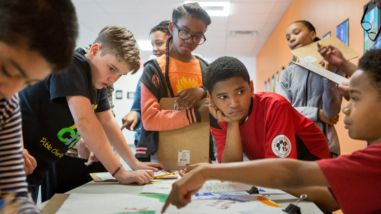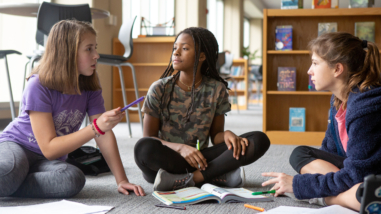Beyond access: Using open educational resources to improve student learning

This is the second in a series of updates about the Education Program’s OER strategy refresh process. The first post was “Exploring the future of open educational resources.”
One of the best parts of my job is getting to meet so many different people who are deeply committed to supporting educators and students. Sometimes it’s grantees who have been working on Open Educational Resources (OER) initiatives for some time, and I love learning from their insights about how their work has evolved over the years. As part of the refresh of Hewlett’s OER strategy this year, I also have tried to be more intentional about listening to people who are new to open education, or who are curious but skeptical about the potential of OER to address the most pressing challenges in education. This helps me to learn about ways we can improve and strengthen how we support groups to advance open education.
Throughout all my conversations this year, one consistent message is that the goals of effective teaching and learning should drive OER adoption. While improving student access to materials has always been a motivator for our work, we haven’t always done a great job of equipping educators or students to use OER in ways that maximize learning. Ultimately, we are aiming to work with communities and educators to ensure that every learner—no matter where they live, what they look like, or how much money they have—has the agency, resources and support to succeed in the 21st century society and economy. OER is one way to make sure that access to instructional materials are not a barrier to learning, and open educational practices can embody the cultural and pedagogical supports that reflect responsive instruction. Only then will learners see themselves as competent and capable problem solvers.
My discussions with colleagues in the field also have revealed that we are still a ways away from realizing this goal. Though we have supported the development of OER content and platforms, access alone is not enough. Equitable and effective use of OER requires an investment in people as well as content. To be clear, it is not enough to shift culture and practice among educators—we need to develop evidence-based approaches that inform how and under what conditions open education resources and practices actually result in different and better outcomes for students. And we need transparency in how we go about this work, for instance by making sure that any technical infrastructure for OER that provides “learning analytics” supports collaborative, data-driven teaching and protects student data.
While we are coming to some early conclusions about challenges in the field, our task is to figure out how the Hewlett Foundation is uniquely positioned to address these challenges. In a recent conversation with our own education team, my colleagues expressed the most energy around these questions:
- How can we focus our grantmaking so that our work more intentionally enables educators to use open education resources and practices to enhance student learning?
- How can we raise awareness about open education among educators who don’t know about it or don’t think it is effective so that they understand its potential to meet their needs and the needs of their students?
- How can we support districts and higher education systems to use OER to systematically improve teaching and learning?
I expect these questions will evolve in the months to come, but they have been useful for guiding early thinking about goals and outcomes for the new strategy and they signal a need for the new strategy to keep educators and their priorities at the center of our work. For example, in K-12 education, we might hope to see more districts adopt and implement OER with aligned professional development supports for teachers. In postsecondary education in the US and globally, progress would include increased institutional support for inclusive and innovative classroom practice with OER (e.g., through teaching and learning centers and libraries).
In this next quarter and through the fall, we will begin drafting the strategy. We will continue to meet with grantees, educators, and students in the summer months to refine our thinking, and we will keep the conversation going about what we are hearing and learning on #HewlettListens. Keep an eye out for a Twitter chat and another update about the strategy in early fall. In the meantime, keep sending us your thoughts and questions about the new strategy in development!



